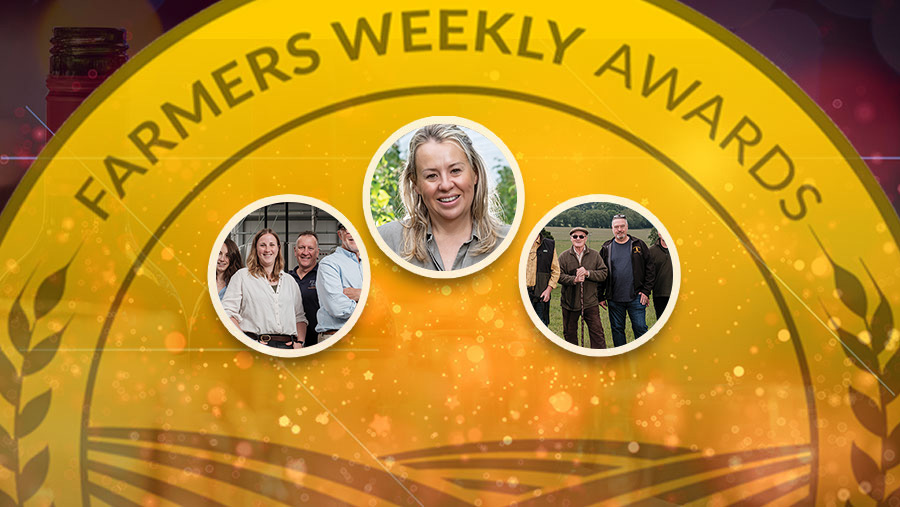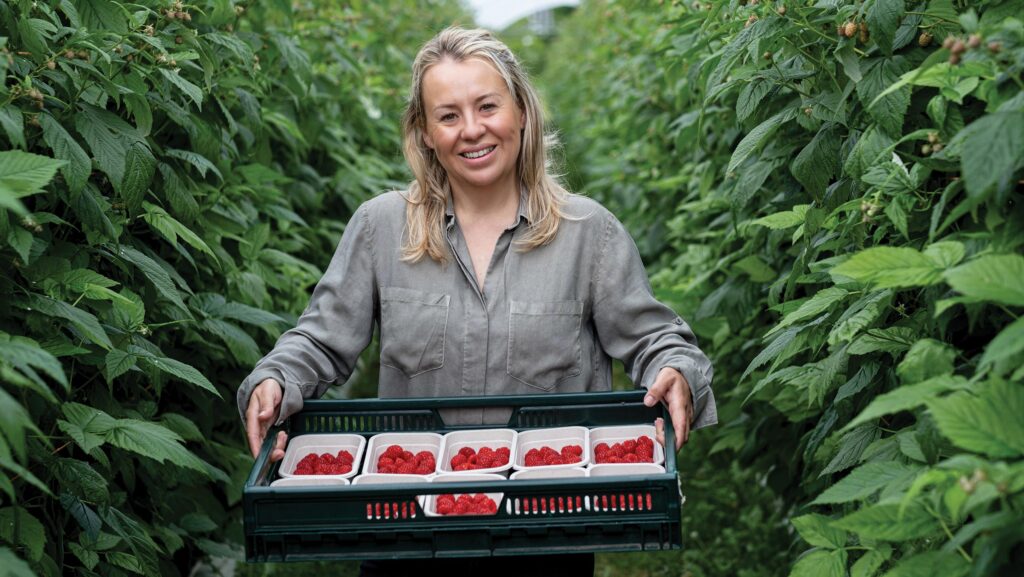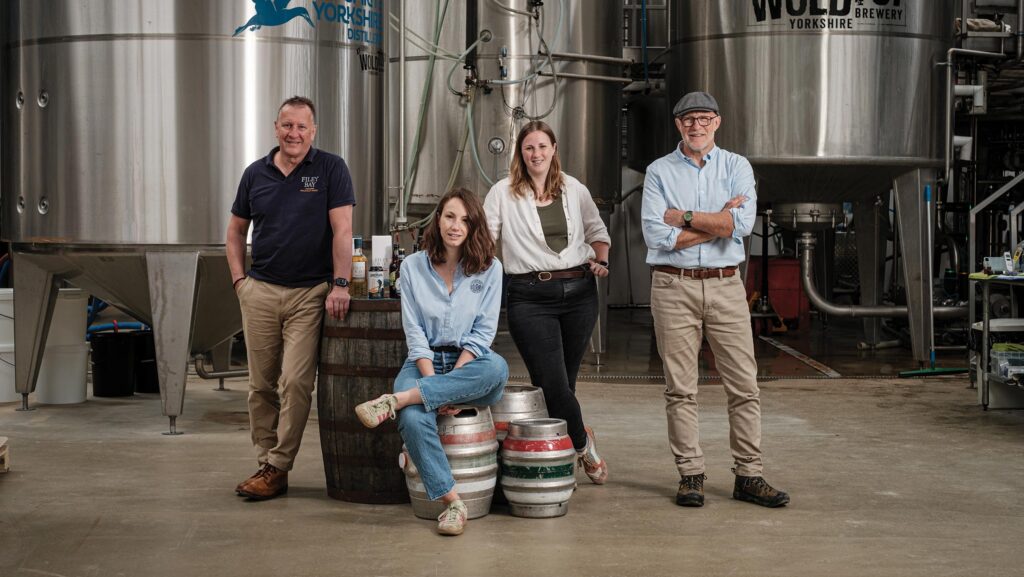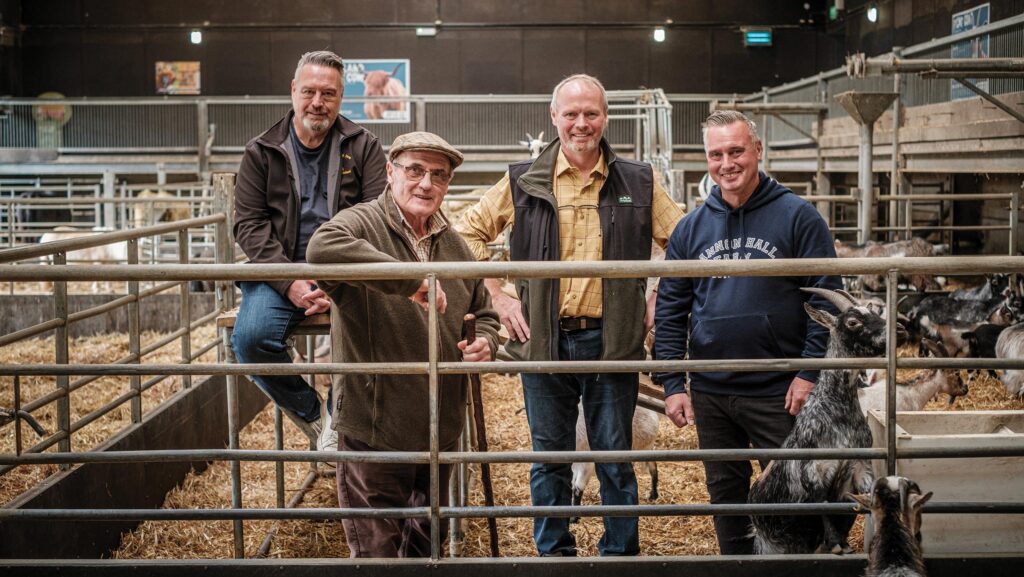FW Awards: Diversification Farmer of the Year 2024 finalists
 FW Diversification of the Year Award 2024 finalists
FW Diversification of the Year Award 2024 finalists This year’s diversification finalists all took ideas and built them into highly successful farming businesses, showcasing innovation, strong entrepreneurial mindsets and a passion to keep the industry moving forward.
Finalists
- Annabel Makin-Jones, Sturton Grange, West Yorkshire
- The Mellor family, Hunmanby Grange, North Yorkshire
- The Nicholson family, Cannon Hall Farm, South Yorkshire
The judges
Nick Evans Co-founder and managing director Oxbury Bank, Nick has vast experience working with farming diversifications seeking to gain investment.
Johnny and Clare Clapp Last year’s winners, Johnny and Clare run an arable and beef enterprise in Devon and also operate a business park, storage units and an anaerobic digestion plant.
Charlie Reeve Farmers Weekly markets editor, with a background on the family beef and sheep enterprise and a farm shop in Northamptonshire.
Annabel Makin-Jones, Sturton Grange, West Yorkshire

Annabel Makin-Jones © Jim Varney
Yorkshire-based fruit grower Annabel Makin-Jones has created a popular range of branded goods including Annabel’s Deliciously British strawberries, jams, chutneys, honey, and Tame & Wild drinks.
The farm covers 160ha, including roughly 32ha of strawberry plants in polytunnels.
Initially, the diversification was created to turn “wonky” out-of-specification fruit into jams, and it has since developed into a fully-fledged business.
It has allowed the business to sell produce at a higher price point and generate a greater margin than for fresh strawberries sold direct to retailers, while also being more sustainable.
There are 350 staff on-site during summer, predominantly for fruit picking and packing, including 40 full-time staff and 15 office staff.
The main site covers 150,000sq ft of large commercial sheds, of which roughly 120,000sq ft is rented out to other businesses, providing an additional income stream.
Farming operations
Roughly 2,000t of strawberries are grown and sold each year, including 600t sold under Annabel’s Deliciously British brand.
The strawberries are grown using a hydroponic system. Certain insects are used as a form of biological pest control in order to reduce the need for pesticides.
The branded strawberries are picked first thing in the morning, packed and delivered the same day.
Raspberries are being grown this year for the first time, and blackberries are due to be introduced next year.
The farm has gained Leaf, British Retail Consortium and Red Tractor accreditations and, given the high water requirement for strawberries, has worked to ensure it has a sustainable water management plan.
Annabel says: “All water consumed is from off-grid supply, with rain water being captured and stored in our on-site lake and borehole water extracted from our own resource.”
The farm also uses solar panels to generate roughly 30% of its annual energy requirement, and has plans to increase this to more than 100%, making it both self-sufficient and able to generate money by selling surplus electricity back to the grid.
To create a desirable staff package, workers are paid the living wage plus performance-related bonuses and are offered accommodation. As a result, the seasonal worker return rate is 85% each year.
Product range
The Annabel’s Deliciously British range accounts for an increasing share of the total business, with the products now sold by several high-end retailers, as well as major farm shops and hotels.
Chutneys and conserves are a newer addition to the business, not only generating an additional income but also minimising waste.
Annabel says: “Due to the use of wonky strawberries within our products, we have reduced our waste and increased the sustainability of the business. We increase sustainability further by sending our waste crop to our packaging supplier, where they get put into an anaerobic digester to power the production of our strawberry punnets.”
Yorkshire forced rhubarb, daffodils and truffles are additional products now being sold under the brand.
The Tame & Wild drinks range is made using fruit grown on the farm and was developed to provide an alternative in the non-alcoholic drink market.
Honey is also produced and sold under the brand, with the bees initially introduced as additional pollinators for the strawberries. There are now 22 colonies of bees and honey is sold by the jar and as whole sheets of honeycomb.
In numbers
- 2,000t volume of strawberries grown annually
- 350 staff on-site during peak season
- 79,000 trees planted on the farm in the past 30 years
- 32ha of strawberries grown on farm
- 3 million bees on farm
Farm facts
- Creates range of jams and conserves using out of specification strawberries
- Uses water stored on farm in lake for hydroponic strawberries
- Generates additional revenue through rental income on-site
The judges liked
- Entrepreneurial drive and ability to spot gaps in the market
- Use of additional businesses to create work for staff all year round
- Cyclical nature of business, with waste products being repurposed
The judges say
“Annabel has created a large profitable enterprise that is able to extract the best value out of its home-grown fruit products and the commercial resources available.”
The Mellor family, Hunmanby Grange, North Yorkshire

Left to right: David Thompson, Jenni Ashwood, Kate Balchin and Tom Mellor © Jim Varney
Based high on the Yorkshire Wolds, the Mellor family have built up an exciting cluster of diversifications which work in unison with the main farming enterprise.
Wold Top Brewery was founded in 2003 and produces a range of beers using home-grown barley. The whisky distillery was established in 2016, with Filey Bay Yorkshire single malt first bottled in 2019.
The business remains a fairly close family operation with Tom Mellor founding both the diversifications and running the farm, while daughters Kate and Jenni oversee the day-to-day operations of the brewery and distillery, respectively.
However, staff numbers continue to expand, with about 45 employees in total.
Farming operations
The family has been growing malting barley for decades, with the free-draining chalky soil providing good growing conditions.
Tom has also reared livestock over the years by contract-rearing bed and breakfast pigs and running a free-range egg unit of 20,000 hens.
However, today the business is solely arable, with more than 180ha of combinable crops and 60ha of grassland.
The farm grows predominantly winter and spring malting barley and winter wheat in a rotation with direct-drilled cover crops.
Tom says the farm was growing a lot of spring barley that was in the ground for only 16 to 18 weeks a year, and for the rest of the year was encouraged to have overwintered stubbles under the various stewardship schemes available.
He has implemented a number of regenerative farming practices and runs predominantly a no-till system using cover crops between cash crops. Sheep are brought in from a neighbouring farm to overwinter on the cover crops, using mob grazing.
Tom says: “As a result, we haven’t needed to put any phosphate or potash fertiliser on our rotation for the past three years. The soil structure has changed beyond all recognition.”
He adds that yields took a bit of a hit to start, but after factoring in cost savings it has paid off and they have reduced costs to below £100/t of grain.
The farm has experimented with a number of barley varieties including Maris Otter, Tipple, Concerto and Laureate.
Both the farm and brewery are powered by wind turbines, with water from boreholes tapping into chalk aquifers under the farm.
Distillery and brewery
The Spirit of Yorkshire Distillery produces a range of award-winning single malt whiskies that are sold at retail and direct to consumers, as well as being exported.
The distillery, which is based just a couple of miles from the home farm, runs several whisky tours a day with tasting sessions, and there is a gift shop and café on-site.
They work closely with Muntons, a local maltster, to ensure they have a ring-fenced malting run and can guarantee that every grain of malt used originated on the farm.
Wold Top Brewery, based on the home farm, brews a range of beers sold in casks, kegs, bottles and cans. It has also expanded into contract brewing, bottling and canning for other labels.
Roughly 400t of malt, which equates to about 500t of malting barley, is used by the businesses each year. Yield is 6-7t/ha, so the farm requires just over 80ha of barley a year to fill its requirement.
It has more than 100ha of spring barley in the ground this year, and a further 40ha of a new winter variety that can also be used for distilling.
Waste products from the brewing process, such as brewers’ grains, are sold to a neighbouring dairy farm.
In numbers
- 12 export markets the whisky is sold in
- 600 barrels of whisky a year produced
- 45 employees
- £60 retail price for a bottle of Filey Bay Flagship single malt
- 500t annual malting barley requirement for distillery and brewery
Farm facts
- Water from on-farm borehole is used in beer to help control both quality and consistency
- Hosts beer festivals and events at brewery to generate additional income
- Looking to expand whisky into new markets, with products now being sold in Asia
The judges liked
- Use of home-grown barley to produce beers and whisky
- Sustainable farming practices with focus on soil health and renewable energy
- Business expansion with café, shop, tours, and events
The judges say
“The Mellor family have built up a thriving brewery, café, and whisky business to complement the farm’s existing arable operations, helping to provide very welcome additional revenue streams.”
The Nicholson family, Cannon Hall Farm, South Yorkshire

Left to right: Richard, Roger, Robert and David Nicholson © Jim Varney
The Nicholson family first opened Cannon Hall Farm to the public in 1989 to stay financially viable during a difficult period for the industry.
It has now grown into a large-scale farm attraction, along with adventure playgrounds, indoor play, a farm shop with butchers, two gift shops and three restaurants.
Cannon Hall Farm is also frequently home to TV shows on Channel 5 including Springtime on the Farm, with brothers Robert, David and Richard Nicolson all featuring in the series.
They have built up a large following as a result, with about 1m visits to the farm attraction, shops and restaurants each year, as well as a sizeable social media presence with more than 750,000 followers.
Farming operations
The brothers rear more than 1,000 pigs, 900 lambs and 300 cattle each year, with about 80ha of permanent grassland and some fodder beet used for outwintering sheep.
They have a mixture of commercial and rare breeds and last year sold a Dutch spotted shearling for £17,000. They also show Highland cattle and have a herd of pedigree Shorthorns.
Further farm buildings are rented from other local farmers to house cattle, catering for additional demand for beef from the farm shop and restaurants. Robert says: “The farm exists to produce meat for the farm shop.”
The butcher’s shop and restaurants account for roughly six cattle, 20 to 30 lambs and 15 to 20 pigs each week, with the in-house butchers and cold storage allowing them to butcher carcasses on-site.
Robert adds: “Our bakery, restaurants and farm shop allow us to balance out our butchery trade, so we can sell forequarter meat through pies, burgers and mince, as well as steaks and joints.”
Visitor attractions
The farm attraction has about 350,000 visitors a year and is based on the farm itself, with raised walkways in the sheds providing safe viewing platforms above the livestock, allowing work to go on uninterrupted below.
Small bags of animal feed are sold to the public for £1 a bag, which can then be poured down a chute directly to the animals below.
A premium service is available, offering visitors the opportunity to feed and pet animals as part of small, guided tour groups.
The farm shop has a milk vending machine which is supplied by a local dairy producer. The business takes a 10% margin, leaving the majority of the profits to go back to the farmer.
Robert says there are ongoing discussions about working with a local dairy farm to make ice cream on-site.
There are several outdoor play areas as well as a large indoor play area which was built in 2015 along with a further café.
Events are hosted on-site throughout the year, ranging from concerts to Halloween pumpkin carving.
One of the major costs to the business is energy, and they have invested in solar panels, air-source heat pumps and a biomass boiler to produce greener energy and offset some of these costs.
The large social media following and TV shows have encouraged more visitors, and there are two gift shops on-site selling farm merchandise, toys and gifts.
A new online video channel has created an additional revenue stream, with more than 3,000 subscribers paying a monthly subscription fee of £3.50 to view videos of life on the farm.
The brothers have also started to produce their own podcast live from the farm.
In numbers
- 1m visits to Cannon Hall Farm each year
- 250 staff
- 6 cattle sold through the farm shop and restaurants each week
- 750k followers across social media channels
- 80ha farm size
Farm facts
- Largest working farm open to the public all year round in the UK
- Hosts educational trips for school children to learn about agriculture
- Additional revenue raised through video content of farm online
The judges liked
- The use of shops and restaurants to sell home-grown beef, lamb and pork
- Partnerships with other local farmers for dairy produce and housing livestock
- Work done to promote agriculture to a wider audience
What the judges say
“The Nicholson family have grown Cannon Hall Farm into a highly profitable commercial farm, which also plays a crucial role in informing consumers about the agricultural industry.”
A word from our sponsor

“As the UK’s leading rural insurer, NFU Mutual is delighted to be sponsoring the award. The finalists’ dedication and innovation inspire us to continue promoting and supporting the industry, ensuring its sustainability and prosperity for generations to come.”
Gregor Belcher, farming propositions consultant at NFU Mutual
